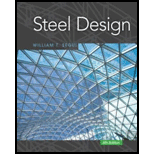
Steel Design (Activate Learning with these NEW titles from Engineering!)
6th Edition
ISBN: 9781337094740
Author: Segui, William T.
Publisher: Cengage Learning
expand_more
expand_more
format_list_bulleted
Concept explainers
Question
Chapter 9, Problem 9.4.1P
To determine
(a)
Whether the beam
To determine
(b)
Whether the beam
To determine
(c)
Number of studs required.
Expert Solution & Answer
Want to see the full answer?
Check out a sample textbook solution
Students have asked these similar questions
I got 5.97 mm please show your work clearly. thank you
A
7K
SK-> VE
3
F
T
A=52 E=29000 ksi
diagonal members
6' A=30.25.72 E=1800 ksi for
horizontal & vertical member
↓
B
Oc
AD
8
Primary Structures remove roller @C make D a roller
For Primary
and Cut BF
For redundant
Ik ↑
ec
Ik = @D
Ik @BF
Consider the geometric and traffic characteristics shown below.
Approach
(Width)
North
South
East
West
(56 ft) (56 ft)
(68 ft)
(68 ft)
Peak hour Approach Volumes:
Left Turn
165
105
200
166
Through Movement
447
400
590
543
Right Turn
162
157
191
200
Conflicting Pedestrian Volumes
900
1,200
1,200
900
PHF
0.95
0.95
0.95
0.95
For the following saturation flows:
Through lanes:
1,600 veh/h/In
Through-right lanes:
1,400 veh/h/In
Left lanes:
1,000 veh/h/In
Left-through lanes:
1,200 veh/h/In
Left-through-right lanes:
1,100 veh/h/In
The total cycle length was 283 s. Now assume the saturation flow rates are 10% higher, that is, assume the following saturation flow rates:
Through lanes:
1,760 veh/h/In
Through-right lanes:
1,540 veh/h/In
Left lanes:
1,100 veh/h/In
Left-through lanes:
1,320 veh/h/In
1,210 veh/h/In
Left-through-right lanes:
Determine a suitable signal phasing system and phase lengths (in s) for the intersection using the Webster method. (Enter the sum of green and yellow times for…
Chapter 9 Solutions
Steel Design (Activate Learning with these NEW titles from Engineering!)
Ch. 9 - Prob. 9.1.1PCh. 9 - Prob. 9.1.2PCh. 9 - Prob. 9.1.3PCh. 9 - Prob. 9.1.4PCh. 9 - Prob. 9.1.5PCh. 9 - Prob. 9.1.6PCh. 9 - A W1422 acts compositely with a 4-inch-thick floor...Ch. 9 - Prob. 9.2.2PCh. 9 - Prob. 9.3.1PCh. 9 - Prob. 9.3.2P
Ch. 9 - Prob. 9.4.1PCh. 9 - Prob. 9.4.2PCh. 9 - Prob. 9.4.3PCh. 9 - Prob. 9.4.4PCh. 9 - Prob. 9.4.5PCh. 9 - Prob. 9.5.1PCh. 9 - Prob. 9.5.2PCh. 9 - Prob. 9.5.3PCh. 9 - Note For Problems 9.6-1 through 9.6-5, use the...Ch. 9 - Note For Problems 9.6-1 through 9.6-5, use the...Ch. 9 - Note For Problems 9.6-1 through 9.6-5, use the...Ch. 9 - Note For Problems 9.6-1 through 9.6-5, use the...Ch. 9 - Note For Problems 9.6-1 through 9.6-5, use the...Ch. 9 - Prob. 9.7.1PCh. 9 - Prob. 9.7.2PCh. 9 - Prob. 9.7.3PCh. 9 - Prob. 9.7.4PCh. 9 - Prob. 9.8.1PCh. 9 - Prob. 9.8.2PCh. 9 - A beam must be designed to the following...Ch. 9 - Prob. 9.8.4PCh. 9 - Prob. 9.8.5PCh. 9 - Prob. 9.8.6PCh. 9 - Prob. 9.8.7PCh. 9 - Prob. 9.8.8PCh. 9 - Use the composite beam tables and select a W-shape...Ch. 9 - Prob. 9.8.10PCh. 9 - Prob. 9.10.1PCh. 9 - Prob. 9.10.2P
Knowledge Booster
Learn more about
Need a deep-dive on the concept behind this application? Look no further. Learn more about this topic, civil-engineering and related others by exploring similar questions and additional content below.Similar questions
- The given beam has continuous lateral support. If the live load is twice the dead load, what is the maximum total service load, in kips / ft, that can be supported? A992 steel is used: Fy = 50 ksi, Fu=65 ksi. Take L = 30 ft. bf For W40 x 149: 2tf = 7.11, = = 54.3, Z 598 in.³ tw W W40 X 149 L (Express your answers to three significant figures.) a. Use LRFD. Wtotal = kips/ft b. Use ASD. Wtotal kips/ftarrow_forwardThe beam shown in the figure below is a W16 × 31 of A992 steel and has continuous lateral support. The two concentrated loads are service live loads. Neglect the weight of the beam and determine whether the beam is adequate. Suppose that P = 52 k. For W16 × 31: d = 15.9 in., tw = 0.275 in., h/tw = 51.6, and M = M₁ = 203 ft-kip, Mn/₁ = Mp/α = 135 ft-kip. P Р W16 x 31 a. Use LRFD. Calculate the required moment strength, the allowable shear strength, and the maximum shear. (Express your answers to three significant figures.) Mu = OvVn = ft-kip kips kips Vu = Beam is -Select- b. Use ASD. Calculate the required moment strength, the allowable shear strength, and the maximum shear. (Express your answers to three significant figures.) Ma = Vn/b - Va = Beam is -Select- ft-kip kips kipsarrow_forwardDetermine the smallest value of yield stress Fy, for which a W-, M-, or S-shape from the list below will become slender. bf/2tfh/tw Shape W12 × 72 8.99 22.6 W12 × 26 8.54 47.2 M4 × 6 11.9 22.0 M12 x 11.8 6.81 62.5 M6 × 4.4 5.39 47.0 S24 × 80 4.02 41.4 S10 × 35 5.03 13.4 (Express your answer to three significant figures.) Fy = ksi To which shape does this value apply? -Select- ✓arrow_forward
- Compute the nominal shear strength of an M12 × 11.8 of A572 Grade 60 steel (Fy = 60 ksi). For M12 x 11.8: d = 12 in., tw = 0.177 in., h/tw = 62.5. Vn = kipsarrow_forwardA flexural member is fabricated from two flange plates 1/2 × 71/2 and a web plate 3/8 × 19. The yield stress of the steel is 50 ksi. a. Compute the plastic section modulus Z and the plastic moment Mp with respect to the major principal axis. (Express your answers to three significant figures.) Z = Mp = in. 3 ft-kips b. Compute the elastic section modulus S and the yield moment My with respect to the major principal axis. (Express your answers to three significant figures.) S = My = in.3 ft-kipsarrow_forward= 65 ksi. A W16×36 of A992 steel has two holes in each flange for 7/8-inch-diameter bolts. For A992 steel: Fy = 50 ksi, Fu For a W16×36: bƒ = 6.99 in., tƒ = 0.430 in., Z = 64.0 in.³ and Sx = 56.5 in.³ a. Assuming continuous lateral support, verify that the holes must be accounted for and determine the nominal flexural strength. (Express your answer to three significant figures.) Mn = ft-kips b. What is the percent reduction in strength? (Express your answer to three significant figures.) Reduction = %arrow_forward
- Find the reinforcements for the mid span and supports for an interior 9 in. thick slab (S-2) in thefloor from Problem 1. Ignore the beams and assume that the slab is supported by columns only (i.e.a flat plate). Sketch the slab and show the reinforcements including the shrinkage andtemperature reinforcement steel. Use f c’ = 4,000 psi and f y = 60,000 psi.NOTE: Problem 3 requires additional column placements at locations such as C and D. The stripof slab between these two columns will behave as a beam support to the one-way slab (with 10 ft.span). Problem 1. The figures below shows the framing plan and section of a reinforced concrete floor system.Floor beams are shown as dotted lines. The weight of the ceiling and floor finishing is 6 psf,that of the mechanical and electrical systems is 7 psf, and the weight of the partitions is 180psf. The floor live load is 105 psf. The 7 in. thick slab exterior bay (S-1) is reinforced with #5rebars @ 10 in. o.c. as the main positive…arrow_forward1- A study of freeway flow at a particular site has resulted in a calibrated speed-density relationship, as follows u = 57.5(10.008k) a) Find the free-flow speed and jam density b) Derive the equations describing flow versus speed and flow versus density c) Determine the capacity of the road 2- A rural freeway has a demand volume of 6750 v/hr. It has four 3.4 m lanes in each direction. The traffic stream is comprised of 8% heavy vehicles and a PHF of 0.94. The terrain is rolling throughout the segment. What is the level of service for the facility? What is the capacity? 3- For an urban freeway, how many 3.6 m lanes in each direction are needed to achieve LOS C on a freeway with a peak hour traffic volume of 5725 v/hr and with a PHF = 0.967 The traffic stream is comprised of 11% heavy vehicles and the location is level terrain.arrow_forwardNote: Provide a clear, step-by-step simplified handwritten solution (with no extra explanations) that is entirely produced by hand without any AI help. I require an expert-level answer, and I will assess it based on the quality and accuracy of the work, referring to the attached image for additional guidance. Make sure every detail is carefully verified for correctness before you submit. Thanks!.arrow_forward
arrow_back_ios
SEE MORE QUESTIONS
arrow_forward_ios
Recommended textbooks for you
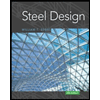 Steel Design (Activate Learning with these NEW ti...Civil EngineeringISBN:9781337094740Author:Segui, William T.Publisher:Cengage Learning
Steel Design (Activate Learning with these NEW ti...Civil EngineeringISBN:9781337094740Author:Segui, William T.Publisher:Cengage Learning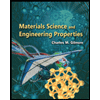 Materials Science And Engineering PropertiesCivil EngineeringISBN:9781111988609Author:Charles GilmorePublisher:Cengage Learning
Materials Science And Engineering PropertiesCivil EngineeringISBN:9781111988609Author:Charles GilmorePublisher:Cengage Learning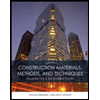 Construction Materials, Methods and Techniques (M...Civil EngineeringISBN:9781305086272Author:William P. Spence, Eva KultermannPublisher:Cengage Learning
Construction Materials, Methods and Techniques (M...Civil EngineeringISBN:9781305086272Author:William P. Spence, Eva KultermannPublisher:Cengage Learning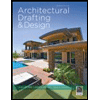 Architectural Drafting and Design (MindTap Course...Civil EngineeringISBN:9781285165738Author:Alan Jefferis, David A. Madsen, David P. MadsenPublisher:Cengage Learning
Architectural Drafting and Design (MindTap Course...Civil EngineeringISBN:9781285165738Author:Alan Jefferis, David A. Madsen, David P. MadsenPublisher:Cengage Learning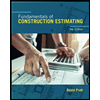 Fundamentals Of Construction EstimatingCivil EngineeringISBN:9781337399395Author:Pratt, David J.Publisher:Cengage,
Fundamentals Of Construction EstimatingCivil EngineeringISBN:9781337399395Author:Pratt, David J.Publisher:Cengage, Traffic and Highway EngineeringCivil EngineeringISBN:9781305156241Author:Garber, Nicholas J.Publisher:Cengage Learning
Traffic and Highway EngineeringCivil EngineeringISBN:9781305156241Author:Garber, Nicholas J.Publisher:Cengage Learning

Steel Design (Activate Learning with these NEW ti...
Civil Engineering
ISBN:9781337094740
Author:Segui, William T.
Publisher:Cengage Learning

Materials Science And Engineering Properties
Civil Engineering
ISBN:9781111988609
Author:Charles Gilmore
Publisher:Cengage Learning

Construction Materials, Methods and Techniques (M...
Civil Engineering
ISBN:9781305086272
Author:William P. Spence, Eva Kultermann
Publisher:Cengage Learning

Architectural Drafting and Design (MindTap Course...
Civil Engineering
ISBN:9781285165738
Author:Alan Jefferis, David A. Madsen, David P. Madsen
Publisher:Cengage Learning

Fundamentals Of Construction Estimating
Civil Engineering
ISBN:9781337399395
Author:Pratt, David J.
Publisher:Cengage,

Traffic and Highway Engineering
Civil Engineering
ISBN:9781305156241
Author:Garber, Nicholas J.
Publisher:Cengage Learning